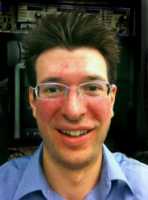29 Jul Memory Consolidation Enhanced By Weak Electrical Brain Stimulation
MedicalResearch.com Interview with:
Flavio Frohlich PhD
Assistant Professor
Departments of Psychiatry, Cell Biology and Physiology, Biomedical Engineering, and Neurology
Neuroscience Center School of Medicine
University of North Carolina at Chapel Hill
MedicalResearch.com: What is the background for this study?
Response: Although we do not understand why we sleep, it is clear that sleep is very important for overall well being and health. One of many likely functions of sleep is memory consolidation, the process of stabilizing previously acquired memories. In particular, a brief electric brain activity pattern called the sleep spindle has been shown to correlate with memory consolidation and learning in general. We asked if this brain rhythm causes memory consolidation by using non-invasive feedback brain stimulation to selectively enhance sleep spindles. We applied a weak electric current in the shape of a sleep spindle to the scalp each time our algorithm detected a sleep spindle in the EEG.
MedicalResearch.com: What are the main findings?
Response: We found that our stimulation approach enhanced memory consolidation and boosted sleep spindles (in comparison to placebo stimulation). Importantly, the more we boosted sleep spindles in a given participant, the more pronounced the memory improvement was.
MedicalResearch.com: What should readers take away from your report?
Response: Sleep spindles, a specific and unique brain rhythm during sleep, contributes to memory consolidation. We have managed to successfully enhance brain activity during sleep in an individualized and adaptive way. Such closed-loop stimulation to modulate brain activity can potentially be used to study the role of brain rhythms in cognition and behavior. Maybe one day, such targeted non-invasive stimulation could become a therapeutic for patients who have impaired sleep spindles, such as people with schizophrenia or Alzheimer’s disease.
MedicalResearch.com: What recommendations do you have for future research as a result of this study?
Response: As any study that reports exciting and novel findings, replication is essential. Also, the therapeutic potential of our research should not be misunderstood. Much more research is needed before we know if our approach can be used to treat patients.
MedicalResearch.com: Is there anything else you would like to add?
Response: The first author of this study was Dr. Caroline Lustenberger, a postdoctoral scholar in the Frohlich Lab. Our study shows how powerful the successful blend of engineering and neuroscience can be.
MedicalResearch.com: Thank you for your contribution to the MedicalResearch.com community.
Citation:
Caroline Lustenberger , Michael R. Boyle , Sankaraleengam Alagapan , Juliann M. Mellin , Bradley V. Vaughn , Flavio Fröhlich. Feedback-Controlled Transcranial Alternating Current Stimulation Reveals a Functional Role of Sleep Spindles in Motor Memory Consolidation. Current Biology, 2016 DOI: 10.1016/j.cub.2016.06.044
Note: Content is Not intended as medical advice. Please consult your health care provider regarding your specific medical condition and questions.
More Medical Research Interviews on MedicalResearch.com
[wysija_form id=”5″]
Last Updated on July 29, 2016 by Marie Benz MD FAAD

